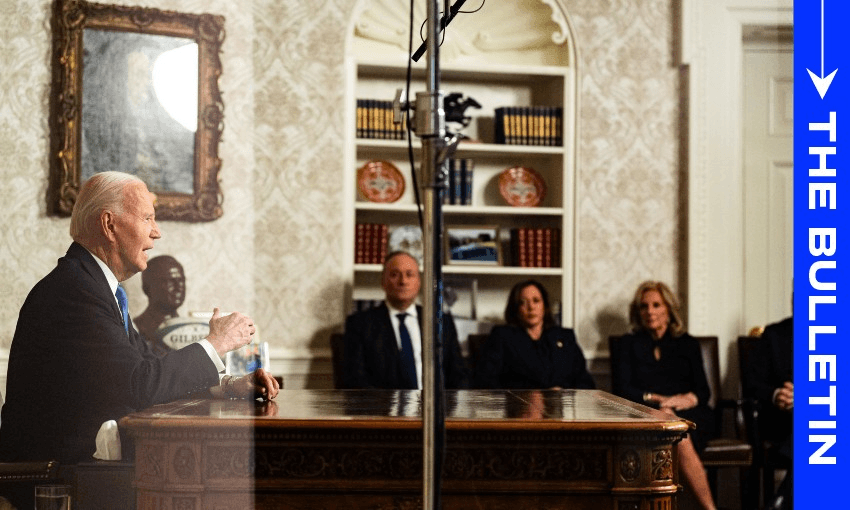The outgoing and incoming presidents have both claimed credit for the historic deal, writes Stewart Sowman-Lund for The Bulletin.
To receive The Bulletin in full each weekday, sign up here.
Biden delivers his final address
We’ve made it to the end of our first week back – how are we all doing? This morning, we’re going to turn our attention internationally. In just a few days time, power will once again shift hands in the United States as the Biden administration comes to a close and the second Trump administration begins. Outgoing president Joe Biden delivered his final White House address yesterday, reported the The Guardian’s Joseph Gedeon, warning Americans that an “oligarchy [of] extreme wealth, power and influence” was taking shape in the United States, a remark likely aimed at billionaires such as Elon Musk. In a direct reference to his successor, Donald Trump, Biden argued that no president should be immune from prosecution for crimes committed while in office.
Monday, the day of the inauguration, brings to a close a half century political career for Joe Biden and a presidency that began amid a pandemic, which feels like a lifetime ago. It ends after a single term, with Biden giving up his bid for reelection and moving somewhat into the background during the election campaign.
Who can claim credit for Gaza deal?
But Biden has pledged not to stay silent once he’s out of the White House. His final speech attempted to highlight his administration’s achievements, from job growth to progress on climate legislation. And, in news that broke shortly before Biden’s address, a major breakthrough in addressing conflict in the Middle East with a ceasefire deal in Gaza. The Spinoff’s Catherine McGregor explained the intricacies of this in yesterday’s World Bulletin, available for Spinoff Members, writing that the first stage of agreement will last for 42 days and include the withdrawal of Israeli forces from densely populated areas and the exchange of hostages and prisoners.
Whether or not the history books will see the ceasefire as a Biden victory or a Trump success remains to be seen – though it may be too little too late for the outgoing president to be remembered for this success. Israel’s prime minister Benjamin Netanyahu has already suggested there are issues with the deal. Both the outgoing and incoming US presidents have claimed they were responsible for brokering the deal, though in reality it appears to have been a bit of both, as The Guardian’s Andrew Roth looks at here. CNN reports a Biden official as saying that cooperation between the two administrations was “almost unprecedented”, though that hasn’t stopped the presidents from bickering. As the BBC reported, while Biden claimed both his team and that of Donald Trump had acted as one during negotiations, he wasn’t going to let his successor take responsibility. “Is that a joke?” Biden said, after a reporter asked who should claim credit. Trump was equally as defiant on his social media platform, Truth Social. “This EPIC ceasefire agreement could have only happened as a result of our Historic Victory in November,” he wrote (capitalisations his own).
Cautious optimism in New Zealand
Here in Aotearoa, there is said to be cautious optimism among Israeli and Palestinian communities of what the deal may mean, reported RNZ’s Lauren Crimp. Representatives from both the Justice for Palestine group and the NZ Jewish Council weren’t confident either side would continue to honour the ceasefire. Foreign minister Winston Peters welcomed the news, saying that New Zealand may support humanitarian aid efforts in Gaza. “A serious analysis is required before we can do all that much ourselves, and other agencies better placed and nearer the situation will be of help, so these are things we’ve got to work on in the next few days,” he said.
Impact of presidency unknown
Regardless of who is remembered for helping to broker the ceasefire, a pause in the conflict will undoubtedly give Trump a political boost at the start of his second round in office. It will allow him to focus his attention instead on domestic issues, of which he has promised to tackle several from day one (possibly including a reversal of the proposed TikTok ban). Here in New Zealand, the impacts of the next Trump administration have already been felt through a drop in our dollar when compared to the US economy. The effect of Trump’s proposed tariffs depends on how hard the incoming president goes on actually implementing them, with reports a more strategic approach may in fact be taken. That speculation has been enough to see our dollar improve slightly, reported The Post.
